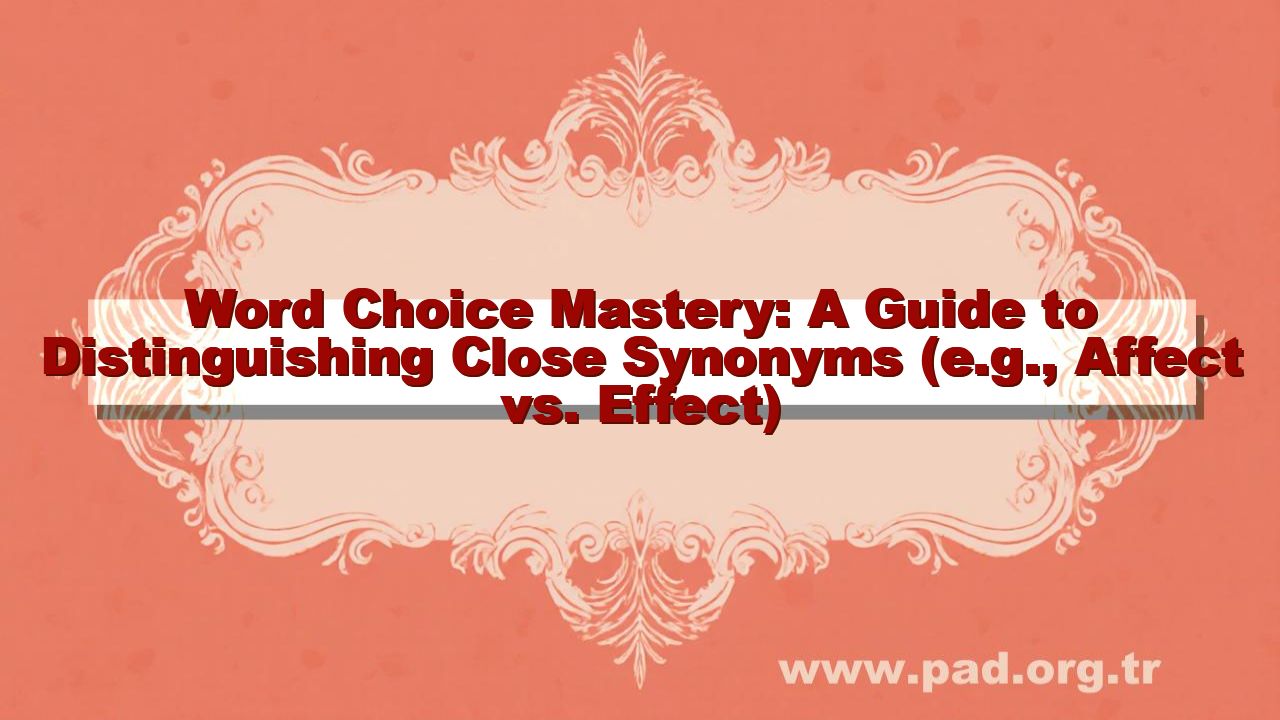Listen up, because this is something every writer absolutely needs to nail down. The core difference between those sneaky, similar-sounding words—like ‘affect’ and ‘effect’—usually comes down to their role in the sentence. We are talking about the difference between an action and a result, and getting it right is the single fastest way to make your writing look sharp and professional. The simple trick for words like the infamous ‘affect’ vs. ‘effect’ pairing is to remember that ‘affect’ is nearly always the verb, meaning to influence, and ‘effect’ is the noun, meaning the outcome or result. Due to the fact that so many seemingly small word swaps can totally change your meaning, this kind of precision isn’t just for English majors; it’s a non-negotiable part of clear, human communication. We’ve all been there, struggling over whether to use ‘fewer’ or ‘less,’ but once you learn these distinctions, you unlock a whole new level of clarity in your prose.
Why Mastering Close Synonyms Is a Game-Changer
Think about how often you read something where a tiny word mistake completely throws you off the scent of the main idea. It happens all the time. Word choice mastery isn’t just about sounding smart; it’s about being understood immediately and accurately. When you’re dealing with close synonyms—words that seem interchangeable but carry profoundly different weights—the wrong pick can undermine your entire credibility. Since that is the case, you have to be intentional about every single word that hits the page. For instance, using ‘disinterested’ when you really mean ‘uninterested’ makes you sound like you don’t care about the subtlety of language, and that can really affect how seriously people take your message. You want your writing to flow and be assertive, not riddled with little semantic roadblocks that force your reader to pause and mentally correct you.
One of the best examples of this difficulty is the ‘affect’ vs. ‘effect’ challenge. Most of the time, ‘affect’ is doing the work of a verb—it is the act of influencing something. “The new policy will affect every department.” Simple, right? But then there’s ‘effect,’ which typically acts as a noun—it is the actual end product or consequence. “The effect of the new policy was an immediate drop in morale.” Yes, there are super rare exceptions where ‘effect’ is a verb (meaning ‘to bring about’ or ‘to execute’) and ‘affect’ is a noun (referring to a psychological demeanor), but for 99% of your writing, sticking to the verb/noun rule for ‘affect’ vs. ‘effect’ keeps you safe and clear.
Beyond ‘Affect’ vs. ‘Effect’: More Common Pitfalls
The confusion doesn’t stop with our favorite A/E pair; plenty of other near-synonyms are lurking, ready to trip up even the most seasoned writer. We’ve all seen ‘further’ and ‘farther’ used incorrectly, and while some style guides are a little relaxed on this, it’s easiest to remember that ‘farther’ is for physical, measurable distance (like, driving farther down the road), and ‘further’ is for figurative or abstract distance (like, needing further clarification or taking the argument further). What’s really interesting is how often people mix up ‘compliment’ and ‘complement,’ which are total communication opposites. A ‘compliment’ is a lovely piece of praise, whereas a ‘complement’ is something that completes or makes perfect, like how wine complements the meal. These small decisions on your word choice truly dictate how polished your final product feels.
Another classic is the ‘disinterested’ vs. ‘uninterested’ mess. A truly disinterested person is neutral and impartial—they have no stake in the outcome, making them the perfect referee. An uninterested person, on the other hand, is bored and couldn’t care less about the topic. It is easy to see how using the wrong one can give a completely different impression of someone’s stance. Think about how a jury should be disinterested in the case to render a fair verdict, but if they were uninterested, they’d probably be asleep. This highlights the high stakes of word choice when conveying precise meaning. Because of all these little things that stack up to create a massive impression, taking the time to truly master these distinctions about close synonyms is just an investment in your personal brand.
It’s essential to look at the subtle connotations too, not just the dictionary definitions. Take ‘imply’ and ‘infer.’ The speaker or writer implies something (they hint at it), and the listener or reader infers something (they deduce it from the evidence). They are two sides of the same communicative coin, and you can’t have one without the other, which is why people swap them all the time. Due to the fact that language is constantly shifting and evolving, some of these rules might soften over time, but for right now, sticking to the standard usage gives you maximum impact and minimizes confusion for anyone who reads your work.
As of this last check on 25 October 2025, one of the biggest trends we’re seeing, especially in digital content, is the increasing casual acceptance of ‘less’ being used for count nouns, which traditionally demanded ‘fewer.’ For instance, seeing “less ingredients” in a recipe title is sadly becoming more common. However, the rule remains: use fewer for things you can count individually (fewer people, fewer mistakes) and less for mass/uncountable nouns (less water, less time). The trend toward brevity and a conversational tone in 2025 seems to be affecting (verb!) the adherence to these traditional rules, but trust me, sticking to the ‘fewer/less’ rule still has a powerful effect (noun!) on your perceived authority. Another interesting movement is the debate around using ‘literally’ figuratively—many style guides now begrudgingly acknowledge the figurative use, but for clear, assertive writing, you should still only use ‘literally’ when you mean something actually happened, not just that you were very surprised. Because I know I’ve been on the receiving end of a confusing email that was full of those small, easily avoidable errors that just make you scratch your head, I try to make sure my own writing is clean and tight.
I remember one time I sent an incredibly important project proposal to a major client, and I almost torpedoed the whole thing by confusing ‘principal’ and ‘principle.’ I used ‘principal’ (meaning head person or main) when I should have used ‘principle’ (meaning a fundamental rule or truth). The client actually called me up, not about the core ideas in the proposal, but just to gently point out that I had confused a school head with a fundamental belief, and the embarrassment was immediate and total, even though we had a good laugh about it later. That moment, though, cemented for me why this level of word choice mastery isn’t just academic—it’s utterly practical and necessary for professional life.


